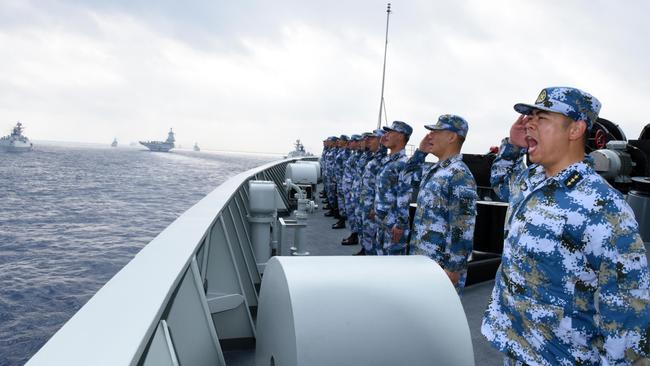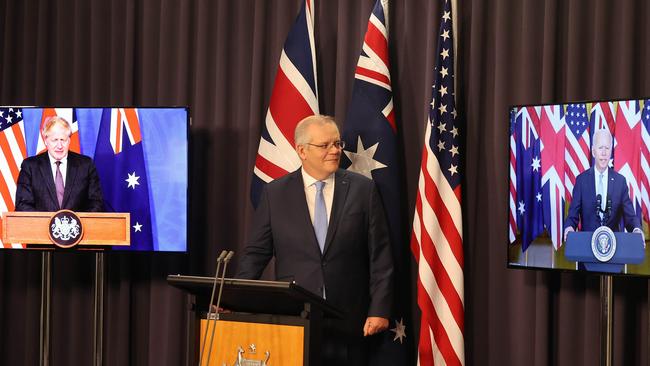China fires off verbal blast over AUKUS deal
China has wasted no time in attacking the AUKUS deal to help Australia acquire nuclear submarines.
NSW
Don't miss out on the headlines from NSW. Followed categories will be added to My News.
China has wasted no time in attacking the AUKUS deal to help Australia acquire nuclear submarines, with Beijing’s US embassy telling all three partner countries to “shake off their cold war mentality and ideological prejudice”.
Foreign ministry spokesman Zhao Lijian said the submarines agreement “gravely undermines regional peace and stability, aggravates arms race and hurts the international nonproliferation efforts”.
“Current difficulties in relations are caused entirely by the Australian side,” he said.
Mr Zhao said the international community, including neighbouring countries, had reasons to question Australia’s commitment to nuclear nonproliferation.
“China will closely monitor the situation,” he said.
He said the UK and US were using nuclear exports as a “geopolitical gaming tool”.
Chinese embassy spokesman Lie Pengyu added that countries should not “build exclusionary blocs targeting or harming the interests of third parties.”
While the response was measured, experts said that Australia should brace for a verbal blast from Beijing over AUKUS, adding that the acquisition of nuclear submarines should be seen as only one part of a much bigger security picture.

“My guess is that more hysterical denunciations will come today,” said Charles Sturt University Professor Clive Hamilton, who has written a number of books about China’s attempts to subvert democracy in Australia and around the world.
“Then Beijing will have to assess the situation carefully,” he said.
The AUKUS agreement, and Australia’s program to acquire nuclear submarines, sends “a very clear signal that Australia is past being bullied,” according to Prof Hamilton.
“That just will not work, at least, as long the Coalition holds the reins in Canberra.”
Peter Jennings, head of the Australian Strategic Policy Institute, was just as blunt in his belief that the submarine program is the result of direct provocation by Beijing.

“We should call the first submarine in this new category the Xi Jinping because no person is more responsible for Australia going down this track,” Jennings told the ABC Thursday, capturing the sense of a number of experts who said that China was not in much of a position to complain about the newly-announced subs deal having provoked it with their behaviour.
Sydney University professor Salvatore Babones, who specialises in the political economy of the Indo-Pacific region, concurred.
China will “see the move as a threat against their own ballistic missile submarines, and they will view it as Australia further embracing what they will likely call its role as ‘the lapdog of American imperialism.’”
And in what may a glimmer of hope for Australian exporters battered by previous diplomatic tiffs, Prof Babones added that his suspicion was that China would ultimately deal with the birth of AUKUS as a strategic, rather than economic, matter.

However, while Australia’s increased assertiveness in the region was welcomed by many, others warn that simply thinking a deal to acquire nuclear powered submarines sometime in the next decade solves all Australia’s defence problems are fooling themselves.
According to Sam Roggeveen, Director of the International Security Program at the Lowy Institute, Australia needs to both be cautious about the United States’ long-term commitment over the course of the next several decades to the Asia-Pacific region and more determined to develop its own self-reliance, submarine deals notwithstanding.
“Australia needs to work on its resilience, which means doing things like bringing more fuel supplies and oil refinery capabilities onshore, as well as munitions, so that you’re not so reliant on sea lines of communications,” he said.

“Hardening our airfields in the north of Australia – it’s not the sort of stuff that’s sexy, but it does an enormous amount to increase your capability.”
While the AUKUS agreement does not come with the sort of commitments to mutual aid seen with the NATO alliance, where an attack on any member is viewed as an attack against all, Roggeveen warns that Australia will almost surely be expected to pay back the favour of shared nuclear technology down the track.
At the same time, other observers note that China’s increasing belligerence is naturally forcing like-minded nations into a variety of agreements.
The so-called “Quad”, or Quadrilateral Security Dialogue, made up of Australia, the US, Japan, and India, quickly moved from being a forum for senior officials of the four nations to talk through issues to become a summit of heads of state who will meet later this year.
China has become increasingly assertive over recent months and days, leading many to believe that Australia’s geography meant it could not go it alone.
China’s military has been increasingly active even in recent weeks, with the Peoples’ Liberation Army Air Force testing Taiwan’s air defences on an almost daily basis.




